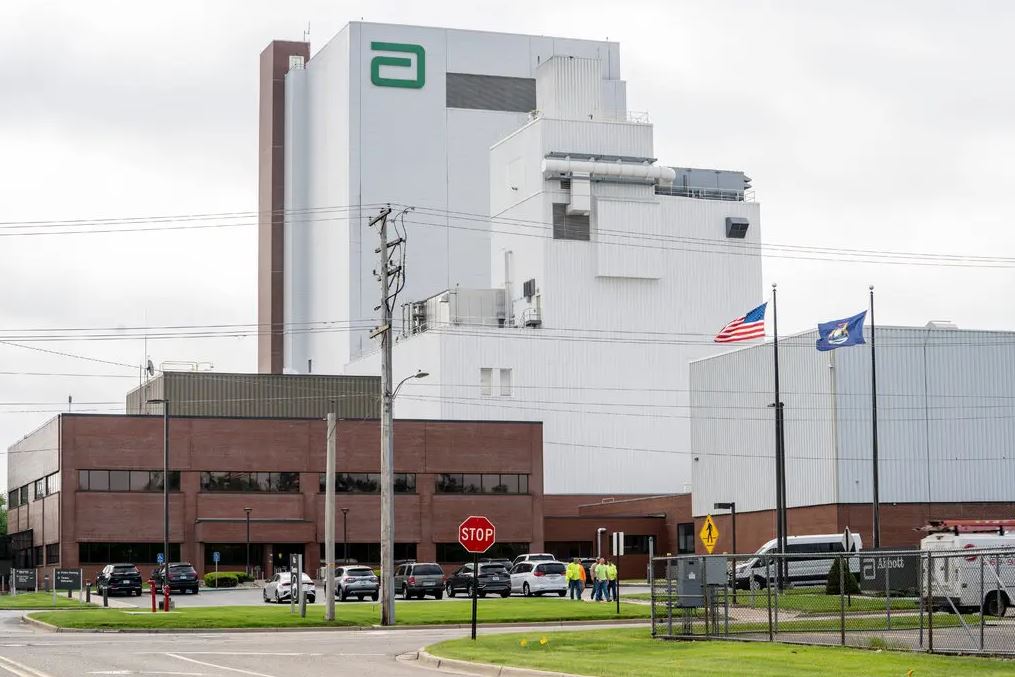The Abbott Nutrition plant in Michigan that was shut down in February, which sparked a widespread baby formula shortage crisis, had a leaking roof, water pooled on the floor, and cracks in key production equipment that allowed bacteria to get in and persist, Dr. Robert Califf, the head of the Food and Drug Administration, told a House panel on Wednesday. This information was provided by Dr. Califf in response to a question regarding the Abbott Nutrition plant.
During a hearing, he informed lawmakers about the “egregiously unclean” conditions that existed in the factory in Sturgis, Michigan, but he also admitted that his agency’s reaction was too delayed in attempting to solve the issues that were present at the plant.
According to Jonathon Hamilton, a spokesperson for Abbott, this effort is anticipated to result in the factory reopening on June 4, with the beginning of the rollout of some formula anticipated for June 20. Although the authorities anticipate that it will take longer to resume full production at the factory, they are hopeful that fresh shipments will hit shop shelves over the next six to eight weeks.
During the hearing, members of the House subcommittee asked the commissioner and other agency officials a number of pointed questions. They wanted answers from an Abbott official about the difficult history of the factory as well as how the business planned to remedy apparent faults and reduce shortages that have caused families all around the nation a great deal of anguish.
The senior vice president of Abbott Nutrition, Christopher Calamari, gave very few explanations for the circumstances at the Michigan facility but expressed his “deep, profound regret” for the shortages. He said that in order to expand supply, the business was scheduling 50 flights a week from its formula factory in Ireland to a dozen airports around the United States.
Committee members pushed back on comments made by the FDA and the administration of President Joe Biden that it was impossible to discern in real time the scale of the contamination and the subsequent breakdown in the supply chain throughout the country. The Abbott factory was responsible for the production of one-fourth of the baby formula in the country, including individualised formulations for those with specific dietary requirements.
The regulatory body had uncovered a plethora of issues at the facility the previous autumn. During this same time period, there were other reports of infants who had been admitted to the hospital due to an uncommon bacterium. According to the Centers for Disease Control and Prevention (CDC), the bacteria Cronobacter sakazakii, which may be fatal to newborns, was discovered in four infants who had taken formula that originated from the plant.
The testimony presented during the hearing made it very evident that the Food and Drug Administration spent months attempting to connect the germs that rendered the first infant ill to bacteria that was subsequently discovered throughout the facility.
Despite the fact that Cronobacter strains associated to two of the newborns did not match samples of the bacteria subsequently identified at the facility, Dr. Califf said that the government regarded those findings to be “inconclusive” due to the limitations of genome sequencing.
This year’s recall was initiated as a result of the infections. The closure of the factory started on February 17 and made shortages much worse, even though they had been spotty at the peak of the epidemic. Parents are having a difficult time as a result of empty shelves, as they are forced to travel hundreds of kilometres to buy baby formula and, at times, must improvise in order to feed their hungry children.
Dr. Califf also admitted that the Food and Drug Administration (FDA) had made several mistakes in its response to this issue. He stated that the FDA’s follow-up inspection in January should have begun sooner, and he further stated that the FDA took too much time to distribute a whistleblower report that had been received in October but did not reach top officials until February.
He informed the legislators that the agency was not provided with an urgent alert when a formula factory discovered the potentially lethal Cronobacter germs. Neither does the government have access to the information on the supply chain that is held in-house by each of the three primary infant formula makers in the United States.
The testimony of an unnamed whistleblower who claimed to have worked at the Sturgis facility was brought up many times over the course of the hearing. The employee who blew the whistle said that the safety team there “celebrated” the F.D.A. neglecting concerns following an inspection in 2019, and that they did not destroy enough merchandise when they identified Cronobacter in final items. According to Mr. Palmer, the fact that senior agency officials did not become aware of such assertions until February “is shocking to me.”
Representative Kim Schrier, a Democrat from Washington, said that particulars in the study indicated “corruption” at the factory. Dr. Califf said that he was unable to affirm or reject the possibility that there may be criminal proceedings in the near or distant future.

